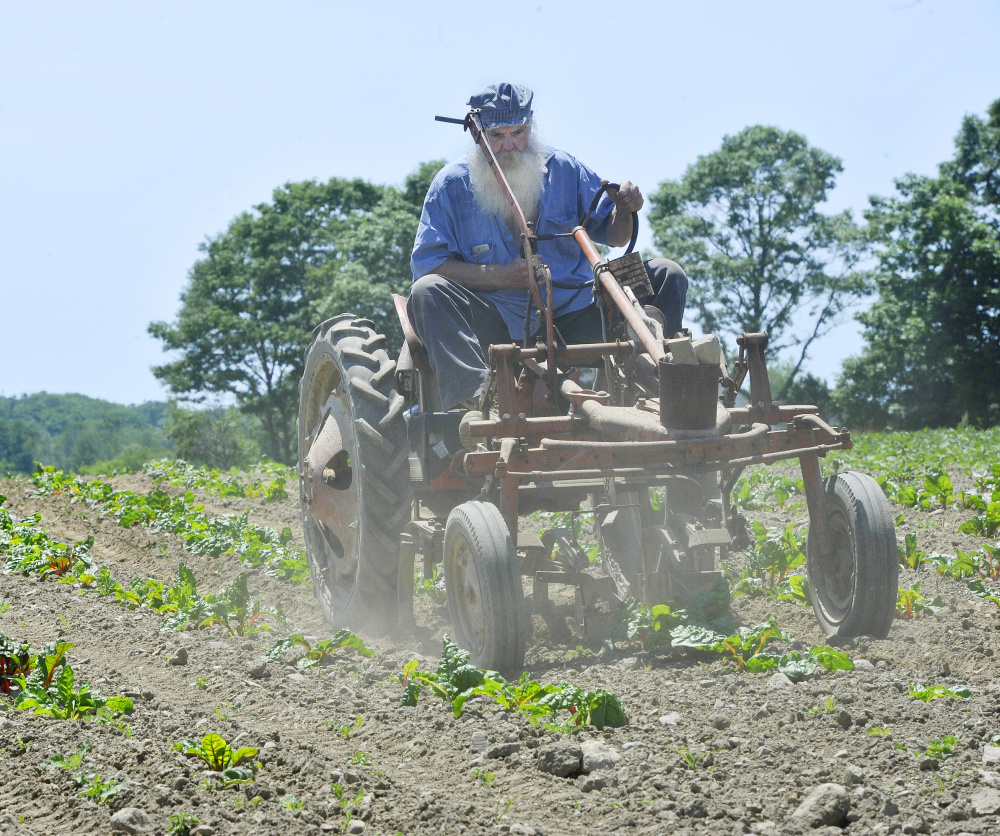A dry spell that has left most of Maine abnormally dry and coastal areas in a moderate drought is creating difficulties for some farmers and gardeners.
Vegetable growers report that some crops are running weeks behind schedule, causing them extra work.
“It’s been an odd season,” said Penny Jordan of Jordan’s Farm in Cape Elizabeth.
The dry conditions are not expected to change anytime soon.
“We are in this pattern where all the rain seems to be to our south,” said Tom Hawley, a meteorologist at the National Weather Service office in Gray.
The rainfall is running about 4 inches below average for the year but 5.8 inches below normal for the last three months. The situation was exacerbated by a scanty snowpack last winter that disappeared by April, a month earlier than usual.
When it does rain, all of the moisture gets sucked up by vegetation, so river and groundwater levels are well below normal, Hawley said.
About 50 percent of Maine is now abnormally dry, up from 30 percent a week ago, with the coast from Kittery to Belfast in a moderate drought, according to the U.S. Drought Monitor, an organization that publishes a weekly map of drought conditions across the country.
The only rain in sight will be passing showers possibly Tuesday into Wednesday, not enough to do much good, according to Hawley.
“We need a two-day steady rainfall with 3 to 5 inches,” he said.
Jordan said some crops are three weeks behind.
Jordan’s Farm produces fruits, vegetables and flowers on about 50 acres. Jordan said the lack of rain has forced the farm to irrigate the land, and that involves more labor. Normally the tomatoes are in the ground the week after Memorial day. This year the tomatoes didn’t get planted until the third week of June, she said.
But strawberries, which tend to rot if there is too much moisture, have benefited from the lack of rain, Jordan said.
“There has been good and bad,” she said of the dry season.
Stew Smith, a former Maine agricultural commissioner who operates the fourth-generation Lakeside Family Farm in Newport, said this is the driest spring he can remember in his 55 years of vegetable growing. The growing season at his central Maine farm this year has been tricky, Smith said.
“As my wife put it in an email, this has been an arctic spring and weeks of desert,” said Smith, who said only 3.25 inches of rain have fallen on his fields since the first of April.
He said much of his 150 acres of mixed vegetable crops are behind.
“We would love some rain,” said Smith, who doesn’t have an irrigation system.
He said his workforce, which normally swells from about seven to 40 hands at the peak, will be slow to ramp up this year. His wife has been scrambling with other farms to fill the orders for their community-supported agriculture business.
But he said peas, a mainstay for July Fourth picnic menus, will be ready.
“We will have peas for the Fourth of July, regardless of what the weather gives,” he said.
Lauchlin Titus, an agronomist at AgMatters, an agricultural consulting firm in Vassalboro, said he is not concerned about the lack or rain.
“People joke about rain dances, but I haven’t seen anyone doing one yet,”said Titus.
He said memories tend to run short when it comes to farming.
Titus said last year was equally dry, with virtually no rain the first six weeks and last six weeks of the growing season.
There has been more rain this year, said Titus.
He said some growers get by with drip irrigation systems, which involve laying a drip hose near the plants on raised beds and installing plastic mulch to keep the moisture in. But the systems have to be in before the crop is sowed.
He said vegetables with larger seeds, such as corn, are doing better than small seeds, such as carrots, which sit close to the top of the soil and without moisture will not germinate.
“If you are going to predict anything, it will be a shortage of carrots. That will send the prices up,” Titus predicted.
He said some crops are doing well, such as the first hay crop. Some tomato growers he works with actually benefited from the dryness, putting them in a couple of weeks early because they didn’t have to stop for rain. Fruit trees, with their deep root systems, also are doing well.
Titus isn’t concerned about the drought conditions.
“It always averages out,” he said.
Agriculture in Maine doesn’t experience true drought disasters that plague other regions of the world, Titus noted.
“We are pretty well blessed at getting moisture at some point in the season and there are enough water sources near enough” to avert disaster, he said.
Send questions/comments to the editors.




Success. Please wait for the page to reload. If the page does not reload within 5 seconds, please refresh the page.
Enter your email and password to access comments.
Hi, to comment on stories you must . This profile is in addition to your subscription and website login.
Already have a commenting profile? .
Invalid username/password.
Please check your email to confirm and complete your registration.
Only subscribers are eligible to post comments. Please subscribe or login first for digital access. Here’s why.
Use the form below to reset your password. When you've submitted your account email, we will send an email with a reset code.